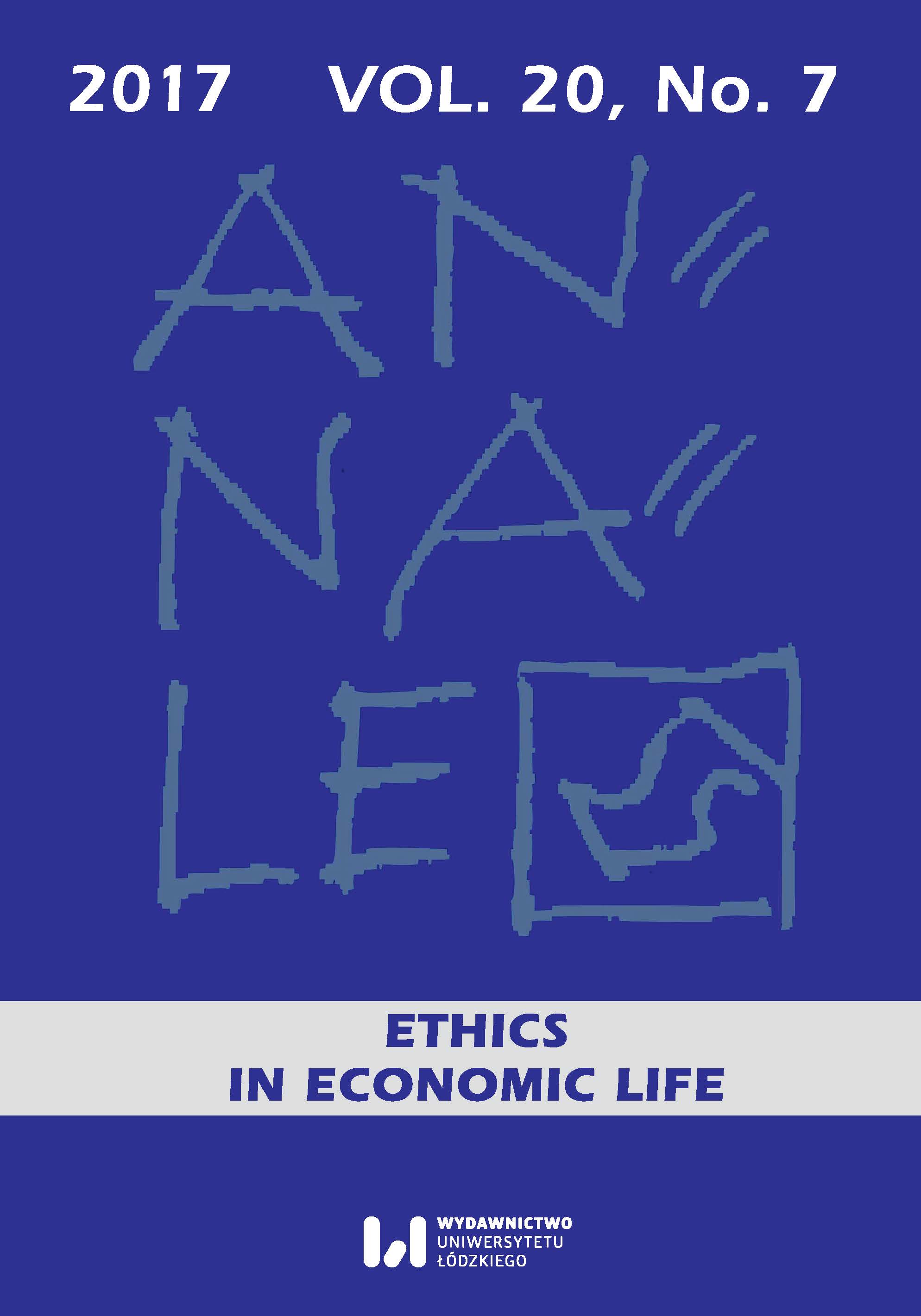Cultural and religious attitude to banking in the great world religions
DOI:
https://doi.org/10.18778/1899-2226.20.7.05Keywords:
banking, great world religions, cultural differencesAbstract
The article examines the attitude of the great world religions (Judaism, Christianity, Islam, Buddhism, Hinduism, and Confucianism) toward the world of finance, including banking. The issue of usury plays a key role in the evolution of ethical aspects related to obtaining compensation for money lending. The presented analysis also focuses on other aspects of banking activities, such as saving, investing and the institutional development of the banking sector. The author underlines the far-reaching convergence between the religions in this area, in spite of the considerable variation in historical and geographical conditions of their formation. The importance of cultural (religious) differences, including some fundamental nuances that affect the banking management in different regions. For successful development, large multinational corporations have to take into consideration the above-mentioned circumstances, regardless of the globalisation processes.
References
Al-Hamzani, M. (2008, August 30). Islamic banks unaffected by global crisis. Asharq-Al-Awsat. http://www.asharq-e.com/news.asp?section=6&id=14245
Google Scholar
Arif, M. (1985). Toward a definition of Islamic Economics: some scientific considerations. Journal of Research in Islamic Economics, 2, 79–83.
Google Scholar
Azid, T. (2010). Anthology of Islamic Economics: Review of some basic issues. Review of Islamic Economics, 13(2), 165–194.
Google Scholar
Botticini, M., & Eckstein, Z. (2012, September). Religious norms, human capital, and money lending in Jewish European history. In The oxford handbook of the economics of religion (online). http://www1.idc.ac.il/Faculty/Eckstein/pdf/Botticini%20and%20Eckstein%20Handbook%20Chapter.pdf
Google Scholar
Collins, R. (1980). Weber’s last theory of capitalism: A systematization. American Sociological Review, 45(6), 925–942.
Google Scholar
Crim, K. (1989). The perennial dictionary of word religions. New York: Harper and Row.
Google Scholar
Czerniak, A. (2010). Symptomy kryzysu globalnego a etyka gospodarcza religii światowych. Analiza porównawcza bankowości islamskiej i bankowości klasycznej w kontekście kryzysu finansowego. MPRA Paper, No. 26971, 48–50. http://mpra.ub.uni-muenchen.de/26971/
Google Scholar
Czerniak, A. (2011). Bankowość islamska wobec globalnego kryzysu finansowego. In T. Dołęgowski (Ed.), Religie światowe wobec współczesnych wyzwań gospodarczych. Warszawa: Oficyna Wydawnicza SGH.
Google Scholar
Farooq, M. O. (2007). Partnership, equity-financing and Islamic finance: Whither Profit-Loss-Sharing? Review of Islamic Economics, 11, Special Issue, 67–88.
Google Scholar
Gellner, D. N. (2009). The uses of Max Weber: Legitimation and amnesia in Buddhology, South Asian history, and anthropological practice theory. In P. Clarke (Ed.), The Oxford Handbook of the Sociology of Religion. Oxford University Press.
Google Scholar
Górak-Sosnowska, K., & Masiukiewicz, P. (2013). Bankowość muzułmańska. Warszawa: Oficyna Wydawnicza SGH.
Google Scholar
Hasan, M., & Dridi, J. (2010). The effects of the global crisis on Islamic and conventional banks: A comparative study. IMF Working Paper, WP/10/201, 670–688.
Google Scholar
Higginson, R., Parsons, M., & Clough, D. (2008, June). Usury, investment and the subprime sector, A Report Commissioned by the Church Investor Group. www.churchinvestorsgroup.org.uk/system/files/documents/editor/
Google Scholar
Horodecka, N. (2011). Ogólne kodeksy etyczne jako wyraz międzynarodowych standardów postępowania w sferze działalności gospodarczej (Master’s thesis). Katowice: Uniwersytet Śląski. www.pafere.org/userfiles/file/magister%202011/natalia_horodecka2.pdf
Google Scholar
Iannaccone, L. R. (1998). Introduction to the Economics of Religion. Journal of Economic Literature, 36(3), 1465–1496.
Google Scholar
Iwanicki, J. (2012). Geneza i etyka gospodarcza nowożytnego kapitalizmu. Przegląd Prawniczy, Ekonomiczny i Społeczny, 2, 11–19.
Google Scholar
Jezierski, A., & Leszczyńska, C. (1998). Historia gospodarcza Polski. Warszawa: Wydawnictwo Key Text.
Google Scholar
Jurkowska, A., (2012). Kryzys finansowy lat 2008–2009 a kondycja finansowa banków islamskich. Studia Ekonomiczne. Zeszyty Naukowe Wydziałowe Uniwersytetu Ekonomicznego w Katowicach, 105, 333–340.
Google Scholar
Kietliński, K. (2005). Religijne, historyczne i kulturowe uwarunkowania etyki biznesu. In K. Kietliński, V. M. Reyes, & T. Oleksyn, Etyka w biznesie i zarządzaniu. Kraków: Oficyna Ekonomiczna.
Google Scholar
Kracik, J. (2004). Kredyt i lichwa jako zjawiska społeczne. 17. Powszechny Zjazd Historyków Polskich, Kraków.
Google Scholar
Kuran, T. (1995). Islamic Economics and the Islamic subeconomy. Journal of Economic Perspective, 9(4), 155–173.
Google Scholar
Kurkliński, L. (2011). Wyzwania rozwojowe bankowości a jej uwarunkowania historyczno-kulturowe w Polsce. Prace Naukowe Uniwersytetu Ekono-micznego we Wrocławiu, 171, 213–223.
Google Scholar
Lehmann, H. (1987). Ascetic Protestantism and economic rationalism: Max Weber revisited after two generations. The Harvard Theological Review, 80(3), 307–320.
Google Scholar
Napoleoni, L. (2008). Economist suggests Islamic finance as solution to economic crisis. UNM Today. http://www4.unm.edu/unmlive/?p=153
Google Scholar
Özturk, I. (n.d.). Global financial crisis highlights benefits of Islamic finance. Todays Zaman. http://www.todayszaman.com/columnists/ibrahim-ozturk_156567-globalfinancial-crisis-highlights-benefits-of-islamic-finance.html
Google Scholar
Siewierski, J. (2010). Idea wielokulturowości. Tradycja Rzeczypospolitej i doświadczenia obecne. Warszawa: Oficyna Wydawnicza SGH.
Google Scholar
Sobieraj, M. (2005). Filozofia Konfucjusza. www.racjonalista.pl/pdf.php/s,4265
Google Scholar
Szołtun, A. (2002). Systemy bankowe w Azji Południowo-Wschodniej. Materiały i Studia NBP, No. 141.
Google Scholar
Szymczak, M. (Ed.). (1983). Słownik języka polskiego. Tom pierwszy A-K. Warszawa: Państwowe Wydawnictwo Naukowe.
Google Scholar
Taeusch, C. F. (1952). The concept of “usury” the history of an idea. Journal of the History of Ideas, 3(3), 291–318.
Google Scholar
Visser, W. A. M., & McIntosh, A. (1998). A short review of the historical critique of usury. Accounting, Business & Financial History, 8(2), 175–189.
Google Scholar
Weber, M. (2010). Etyka protestancka a duch kapitalizmu. Warszawa: Wydawnictwo Aletheia.
Google Scholar
Wierzbicki, J. (2011). Ochrona konsumenta przed nadmiernymi odsetkami. Skuteczność rozwiązań antylichwiarskich. Praktyczna Teoria. http://www.praktycznateoria.pl/ochrona-konsumenta/
Google Scholar
Yeung, I. Y. M., & Tung, R. L. (1996). Achieving business success in Confucian societies: The importance of Guanxi (Connections). Organizational Dynamics, 25(2), 54–65.
Google Scholar
Downloads
Published
How to Cite
Issue
Section
License
Copyright (c) 2017 Annales. Etyka w Życiu Gospodarczym

This work is licensed under a Creative Commons Attribution-NonCommercial-NoDerivatives 4.0 International License.









